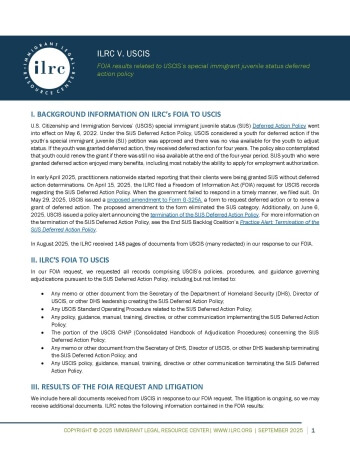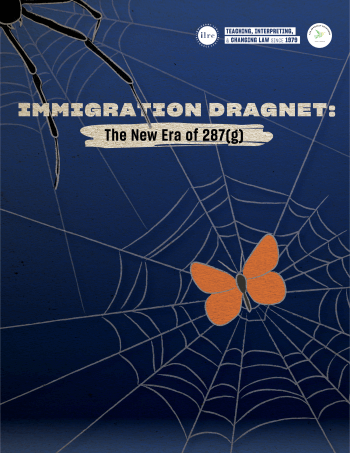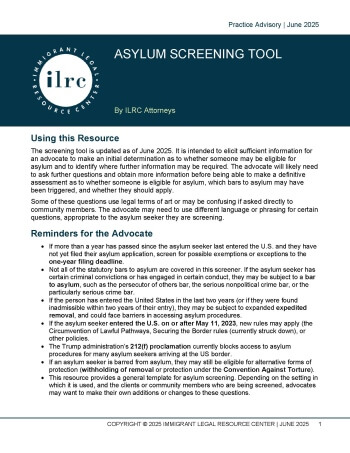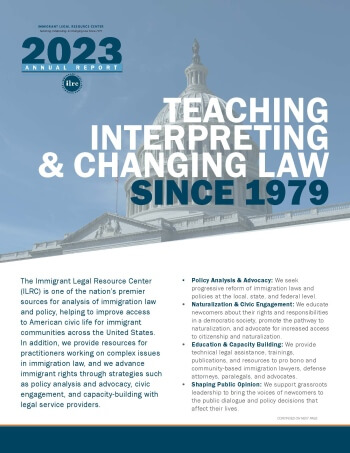Many noncitizen defendants are already deportable (“removable”). This includes all undocumented people, as well as lawful permanent residents (green card-holders) who have become deportable because of a conviction. If immigration authorities find these people – which is likely to happen – they will be deported unless they are granted some kind of immigration relief. For these defendants, staying eligible to apply for immigration relief is their most important immigration goal, and may be their highest priority in the criminal defense.
From October 3-7, 2025, Goodwin Simon Strategic Research surveyed a statewide representative sample of 1,213 registered voters. The poll explored voter attitudes towards mass deportation, recent ICE actions, and sanctuary protections in the state. Uniquely, this poll explores key themes that may be driving Californians’ growing disapproval of mass deportation, including revealing voters’ strong support for due process, including for people with past records, and equal treatment in the legal system, regardless of immigration status. Voters also expressed deep concern with the cost of the Trump administration’s approach to immigration on taxpayers.

On April 15, 2025, the ILRC filed a Freedom of Information Act (FOIA) request for USCIS records regarding the SIJS Deferred Action Policy. When the government failed to respond in a timely manner, we filed suit. This resource includes all documents we have received from USCIS as a result of the FOIA request, as well as a short summary of the request and results.

Section 287(g) of the Immigration and Nationality Act (“INA”) authorized the creation of a program that allows state and local law enforcement agencies to act as immigration enforcement agents.This policy brief reviews the recent history of 287(g) agreements and how they’ve proliferated, describes the three 287(g) agreement models, examines a case study of escalating 287(g) programs in Florida, delves into the programs’ dangers and harms, and provides some recommendations for local communities that want to stop 287(g) agreements in their tracks.

This tool offers a template that practitioners can use to help identify possible asylum eligibility. The screening questions are intended to elicit information about the basis of an asylum claim, identify possible bars and challenges, and flag areas where further follow-up may be needed. Accompanying the screening tool are some notes to help guide practitioners in assessing relief and spotting potential issues.
The Immigration Legal Resource Center (ILRC) has developed a comprehensive framework to enhance its engagement with directly impacted community members. This framework is designed to systematically involve these individuals in the ILRC’s activities, ensuring that their voices and experiences are central to our work.

The ILRC has published its 2024 Annual Report, which includes information about the initiatives the organization took that year, as well as the organization's financial position.

The ILRC has published its 2024 Annual Report, which includes information about the initiatives the organization took that year, as well as the organization's financial position.
This resource compares immigration enforcement in Texas before Trump’s inauguration on January 20, 2025 with the policies Trump has instituted since he has taken office. Our analysis shows that Governor Abbott’s immigration enforcement policies led the way for Trump’s actions. Texas has served as experimentation grounds for hateful and sweeping immigration enforcement policies which were quickly adopted by Trump 2.0 for the national level and have also infected other states who have enacted Texas copycat laws and policies. Our analysis below is a mere snapshot of the Texas and federal immigration enforcement policies that are currently in place.

Tracking all the tactics this administration is deploying to target immigrants is overwhelming. In this document, we attempt to summarize some of the key ways the Trump administration is shifting policies and practices to surveil, arrest, detain, deport, and silence immigrants and the people who support them. We do not name every shift; rather, we focus on the weaponization of the criminal legal system, the increasingly authoritarian approach, and the role of the federal budget, which are key tools of the Trump administration’s brutality and also vital sites of advocacy needed to stem the tide.